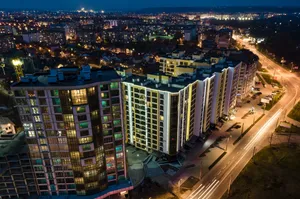Keeping abreast of alterations in Turkish real estate laws is essential for expats seeking to rent or purchase property in Turkey. As the market evolves, understanding these changes can help expats make informed decisions, mitigate potential legal issues, and secure a comfortable and enjoyable living experience. In this article, we delve into the recent changes in Turkey's real estate laws to highlight crucial updates that expats need to be aware of in their pursuit of an ideal home.
At Ikamet, we strive to provide expats with the resources necessary to facilitate their transition into Turkey's rich cultural landscape; as the largest online resource for expats living in Turkey, you can trust our knowledge and expertise to guide you through the dynamic Turkish real estate market. Journey with us as we explore the new Turkish real estate regulations and provide insights into their potential impacts on expats, ensuring you remain well-equipped to navigate any challenges that may arise in your pursuit of Turkish property ownership or rental agreements.
Impact of New Property Valuation Rules on Residence by Investment
A significant legal change affecting expats and potential Turkish property buyers revolves around property valuation requirements for residence permits and citizenship applications. Previously, the minimum property value for securing a residence permit was $50,000, rising to $75,000 in metropolitan cities like Istanbul, Antalya, and Ankara. To qualify, property purchases had to occur between April 26, 2022, and October 16, 2023. Furthermore, all previous permits issued based on real estate investment are grandfathered prior to October 16th. This means that residency permit renewals will continue regardless of the investment you made in the past.
Starting from October 16, 2023, the new property valuation requirement for all cities across Turkey is a $200,000 market value. This applies to residence permits by investment applications. Meanwhile, the citizenship through real estate investment requires a $400,000 market value.
For residence by investment, the TAPU (title deed) listing price must be more than $200,000, and the Central Bank payment slip should reflect a value exceeding $200,000 as well. The value is $400,000 for citizenship by investment and follows the same principles as the TAPU and Central Bank valuation requirements. Under the new regulations, there is no need for a separate valuation report, simplifying the process for potential buyers.
To be eligible for Turkish citizenship based on a $200,000 property investment, you must remain in the country for an uninterrupted 5 years.
Top Cities in Turkey for Real Estate Investment
Turkey's diverse regions offer a range of investment opportunities for expats looking to capitalize on the real estate market. The following are some of the top cities in Turkey for property investment:
1. Istanbul
As Turkey's largest and most populous city, Istanbul presents a robust real estate market. The city's strategic location straddling Europe and Asia, along with its rich cultural heritage and strong economy, make it a lucrative investment destination. Investors can find a variety of properties, from modern luxury apartments to traditional Ottoman houses, catering to diverse requirements and budgets.
2. Izmir
Located on the western coast of Turkey, Izmir is a rapidly developing city known for its cosmopolitan atmosphere and vibrant social scene. Its diverse neighborhoods offer a variety of investment opportunities, from waterfront properties in the bustling Alsancak district to tranquil family homes in the leafy Karşıyaka area. The city boasts strong infrastructure and a favorable climate, making it an attractive option for property investors.
3. Mugla
Mugla province, home to popular coastal destinations such as Bodrum, Marmaris, and Fethiye, is a sought-after location for those seeking properties with stunning sea views and a relaxed Mediterranean lifestyle. The region has experienced significant growth in recent years, attracting both domestic and international investors. Whether looking for holiday homes or buy-to-let properties, Mugla offers plenty of lucrative opportunities.
4. Ankara
As Turkey's capital, Ankara has a stable real estate market backed by a strong local economy and a growing expat community. The city offers a range of properties, from centrally located apartments to suburban family homes in peaceful neighborhoods. With ongoing development projects and infrastructure improvements, Ankara is a sound choice for long-term property investments.
5. Antalya
Encompassing the idyllic Turkish Riviera, Antalya is a popular destination for tourists and expats alike. The city's beautiful beaches, excellent climate, and high-quality amenities attract long-term residents and holidaymakers, increasing property demand and rental potential. Antalya's real estate market offers diverse options, from affordable apartments to luxurious villas, making it an appealing location for investors with varying budgets.
In-depth Analysis: Pluses and Minuses of the New Property Valuation Rules
Understanding the advantages and disadvantages of the updated property valuation requirements can help expats gauge their impact on their real estate endeavors.
Advantages:
- Simplified process: The elimination of the need for a separate valuation report streamlines the property purchase process for expats and reduces bureaucratic hurdles.
- Market stimulus: By setting a higher minimum valuation requirement, Turkish authorities may encourage expats to invest in more luxurious properties, stimulating economic growth in the real estate sector.
Disadvantages:
- Higher thresholds: The increased valuation requirements may deter some expats from investing in Turkish property, making it more challenging for those with limited budgets.
- Geographic disparities: The uniform valuation requirement across all cities may hinder investment in smaller cities or rural areas, where property values may be lower than the $200,000 threshold.
Navigate Turkish Real Estate with Confidence
Understanding and adapting to the recent changes in Turkish real estate laws is crucial for expats looking to rent or purchase property in Turkey. By staying informed of these updates and seeking expert guidance, expats can make well-informed decisions and navigate the dynamic Turkish property market with ease. Ikamet, the largest online resource for expats living in Turkey, provides the comprehensive information and support needed to ensure a seamless property acquisition experience. Explore Ikamet to stay updated on the latest legal changes, scout the best investment opportunities, and benefit from valuable insights tailored specifically for expats in Turkey. Begin your search for the perfect Turkish home with Ikamet today and secure your dream property with confidence.
Ready to find your ideal home in Turkey? Visit Ikamet and access a wealth of expert advice and resources, ensuring a successful property investment experience.
What are the new property valuation requirements for obtaining a residence permit by investment in Turkey?
The new valuation requirement is a $200,000 market value for all cities across Turkey, effective from October 16, 2023,1.
What is the new property valuation requirement for obtaining Turkish citizenship through real estate investment?
The valuation requirement for citizenship through real estate investment is a $400,000 market value1.
How has the property purchase process been simplified for expats?
The elimination of the need for a separate valuation report has streamlined the property purchase process for expats1.
How might the new valuation requirements stimulate economic growth in Turkey's real estate sector?
By setting a higher minimum valuation requirement, Turkish authorities may encourage expats to invest in more luxurious properties, stimulating economic growth in the real estate sector1.
What challenges might arise from the increased valuation requirements?
The higher valuation requirements may deter some expats, especially those with limited budgets, and the uniform valuation requirement across all cities may hinder investment in smaller cities or rural areas where property values may be lower than the $200,000 threshold1.
How do the new regulations affect individuals who had obtained residence permits based on real estate investment before the changes?
Individuals who had obtained residence permits based on real estate investments before October 16, 2023, are grandfathered, meaning that their residency permit renewals will continue regardless of the investment value they made in the past1.
Are the new property valuation requirements affecting other permit classifications, such as touristic permits?
All permit classifications for renewals are unchanged. For accurate information, consulting with legal experts or relevant Turkish government authorities is advisable.1
If I have a residence by investment (real estate permit), and I sell my property and buy another one in a different area, what happens?
Upon selling and buying in another area, the new valuation requirement of $200,000 applies based on the TAPU date, applicable nationwide regardless of being a transfer, renewal, or a first-time application.1











Member discussion